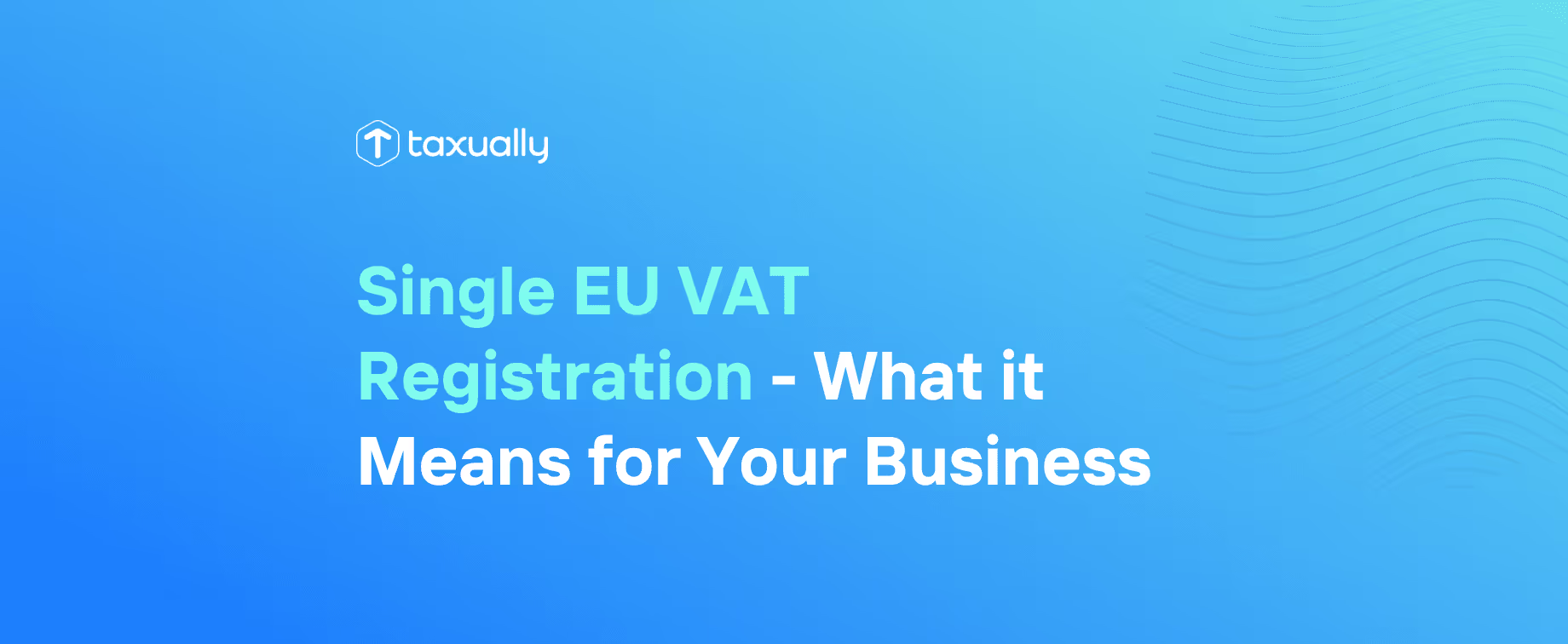Key takeaways
- Single EU VAT registration simplifies compliance: Businesses will only need to register for VAT in one EU Member State to manage all their cross-border sales and movements of goods across the EU.
- Major OSS and IOSS expansions: The new rules extend the One Stop Shop and Import One Stop Shop schemes to cover more types of transactions, including marketplace sales and intra-EU stock movements.
- Implementation planned for 2025: The Single EU VAT registration under the ViDA initiative is expected to take effect on January 1, 2025, reducing administrative burdens and saving businesses an estimated €5 billion annually.
Background
Single EU VAT registration is based on the existing One Stop Shop model for ecommerce traders. This is one of the measures within the scope of the VAT in the Digital Age (ViDA) initiative by the EU. Upon successful implementation, ViDA is expected to result in an additional €18 billion per year in VAT revenues for Member States and €5 billion in annual savings for businesses in compliance costs over the next decade.
The expansion of the One Stop Shop scheme will include additional sales, enabling businesses to register only once in a single Member State for their supplies across the EU. This includes when they simply want to move stock to another EU Member State in order to be sold there directly to consumers at a later stage. The changes will allow them to handle their VAT obligations via a single online portal in one language.
What this means for businesses
These changes will impact businesses registered for VAT that undertake cross-border EU trade.
- Businesses will need to apply the reverse charge to all domestic B2B supplies of goods and services by non-established companies, which shifts the responsibility of paying VAT to the customer instead of the supplier, except for transactions subject to the margin scheme.
- The call-off stock regime will cease to exist and will be substituted by a new OSS scheme. This new scheme will also eliminate the requirement for EU VAT registration abroad for deemed Intra-Community transactions. Such movements of own goods within the EU will be reported in the new OSS scheme and considered VAT-exempt, except for the transfer of capital goods.
- Businesses selling via online marketplaces must be aware that the deemed supplier model will be extended to all types of supplies made within the EU via a marketplace, regardless of where the seller is established or the status of the customer.
- The Union OSS scheme will be extended to all B2C supplies of goods within the EU, including supplies with installation, supplies on board of aircraft, ships, trains, energy supplies, etc. The new scheme can be applied for domestic margin-scheme goods to any other taxable person supplied under the margin scheme by taxable dealers.
- The scope of the Union OSS scheme will also be extended to allow businesses that sell via online marketplaces (i.e. electronic interfaces) and that are not VAT-registered in the EU country where the transaction takes place to use the electronic interfaces to declare their domestic B2C supplies of goods.
- The scope of the Union OSS scheme will also be extended to allow businesses that sell via online marketplaces (i.e. electronic interfaces) and that are not VAT-registered in the EU country where the transaction takes place to use the electronic interfaces to declare their domestic B2C supplies of goods.
- The non-Union OSS scheme will be extended to cover supplies of services made by non-EU suppliers to all final customers, even if they do not have a permanent address, and don’t usually reside in an EU Member State.
- IOSS will also become mandatory for distance sales of imported goods made via marketplaces operating under the deemed supplier model.
What is happening and by when
The changes within the broader ViDA initiative are only at the proposal stage. There are still public consultations to be held as well as further discussions to be had in the EU parliament and the EU Council. As of now, the Single VAT return updates are due to come into force on January 1, 2025.
If you have any further questions about how single EU VAT registration in will affect your EU trade or would like to learn how Taxually can help your business remain compliant in the ever-changing VAT legislative landscape, please contact: ryan.linton@taxually.com
Frequently asked questions
New Year's Day - 1/1/2024Memorial Day - 5/27/20244th of July - 7/4/2024Labor Day - 9/2/2024Thanksgiving Day - 11/28/2024Day after Thanksgiving - 11/29/2024Christmas Eve - 12/24/2024Christmas Day - 12/25/2024
What is the Single EU VAT Registration under ViDA?
The Single EU VAT Registration is part of the EU’s VAT in the Digital Age (ViDA) initiative, expanding the One Stop Shop (OSS) system. It allows businesses to register for VAT in just one EU Member State and handle all cross-border VAT obligations through a single online portal.
How will Single EU VAT Registration affect my business?
From 2025, businesses engaged in cross-border EU trade will no longer need multiple VAT registrations across Member States. The new OSS system will simplify reporting, eliminate the call-off stock regime, and make it easier to manage VAT compliance for intra-EU movements of goods and online marketplace sales.
When will the new Single VAT Registration rules come into effect?
The proposed Single EU VAT Registration changes are expected to take effect on January 1, 2025, pending final approval by the EU Parliament and Council. Businesses should begin preparing now by reviewing their VAT processes and ensuring readiness for the ViDA transition.



















